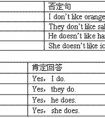They often help ___________with their housework.[ ]A. with each otherB. for each otherC. to each otherD. each other-七年级英语
题文
| They often help ___________with their housework. |
| [ ] |
| A. with each other B. for each other C. to each other D. each other |
答案
| D |
据专家权威分析,试题“They often help ___________with their housework.[ ]A. with..”主要考查你对 相互代词,介词 等考点的理解。关于这些考点的“档案”如下:
相互代词介词
考点名称:相互代词
- 相互代词:
就是表示相互关系的代词。它与它所指代的名词或代词是一种互指关系,因此它们是复数或者二者以上。
英语中的相互代词只有两个,即each other和one another。
在正式文体中多用each other指两者,用one another指两者以上。
我们应当把它们当作复合代词看待,即使在分开使用时,它们也是相互关联的。
在句中,相互代词可用作宾语、定语等。例如:
Don't talk to each other (one another).
We must help one another. - 相互代词的用法:
相互代词只有each other和one another两个词组。他们表示句中动词所叙述的动作或感觉在涉及的各个对象之间是相互存在的,例如:
It is easy to see that the people of different cultures have always copied each other.
显而易见,不同文化的人总是相互借鉴的。
相互代词的句法功能:
a. 作动词宾语;
We often help each other in our lessons.
我们经常在功课上互相帮助。
They see one another every day.
他们每天见面
b. 可作介词宾语;
Does bark, cocks crow, frogs croak to each other.
狗吠、鸡鸣、蛙儿对唱。
说明:传统语法认为,相互关系存在于两个人或物之间用each other,存在于两个以上人和物之间用one another。
现代英语中,两组词交替使用的实例也很多,例如:
He put all the books beside each other.
他把所有书并列摆放起来。
He put all the books beside one another.
他把所有书并列摆放起来。
Usually these small groups were independent of each other.
这些小团体通常是相互独立的。
c.作定语时须用所有格
The students borrowed each other's notes.
学生们互借笔记。 相互代词each other和one another的区别:
1. 一般认为 each other 指两者,other another指三者或三者以上。但在实际运用中,这两个短语常可互换:
We respect each other [one another]. 我们互相尊重 (对方)。
The sea and the sky seemto melt into one another [each other]. 大海和蓝天似乎融为一体。
2. 两者均有所有格:They know each other’s [one another’s] weak points. 他们都彼此了解对方的缺点。
3. each other 可折开用 (each…the other),而 one another则不能:
We helped each other. =We each helped the other. 我们互相帮助。
4. 汉语的“互相”是副词,但是英语中的 each other 和 oneanother均为代词,因此在及物动词之后可直接用作宾语 (如help eachother);
而在不及物动词之后,则要借助介词 (如talk to each other, learn from one another 等)。
5.这两个短语均不能用作主语:
正:We each know what the other thinks.
误:We know what each other [one another] thinks.
正因为不能用作主语,所以用它们作宾语的句子不能改为被动语态。
考点名称:介词
- 介词:
是一种用来表示词与词、词与句之间的关系的虚词,在句中不能单独作句子成分。
介词后面一般有名词代词或相当于名词的其他词类,短语或从句作它的宾语。 - 介词的分类:
(1)表示时间,处所:从 自 自从 于 打 到 往 在 当 朝 向 顺着 沿着 随着
(2)表示方式:按 照 按照 依 依照 本着 经过 通过 根据 以 凭
(3)表示目的:为 为了 为着
(4)表示原因:因 由于 因为
(5)表示对象,范围:对 对于 把 向 跟 与 同 给 关于
(6)表示排除:除 除了 除去 除非
(7)表示被动:被 叫 让 给
(8)表示比较:比 和 同
上述介词中的“着,了,过”是语素,不是动态助词。 介词at, in, on的区别:
1. 表示时间,注意以下用法:
(1) 表示时间的某一点、某一时刻或年龄等用 at。如:
I get up at six in the morning. 我早上六点钟起床。
He got married at the age of 25. 他 25 岁结婚。
(2) 泛指一般意义的上午、下午或晚上以及月或年等较长的时间,一般用 in。如:
We watch TV in the evening. 我们晚上看电视。
He went to Japan in 1946. 他于 1946 去了日本。
(3) 若表示星期几或某一特定的日期,则用 on。如:
He left here on the fifth of May. 他于 5 月 5 日离开这儿。
2. 表示地点、场所、位置等,注意以下用法:
(1) 表示某一点位置,用 at。如:
We live at No 87 Beijing Road. 我们住在北京路 87 号。
The hospital is at the end of the street. 医院在这条街的尽头。
与名词所有格连用表示地点,也用 at。如:
at my sister’s 在我姐姐家 at the doctor’s 在医务室
(2) 表示空间或范围,用 in。如:
What’s in the box? 这盒子里有什么?
He lives in Paris with his wife. 他同他妻子住在巴黎。
但有时两者可换用。如:
The meeting was held at [in] the hotel. 会议在宾馆举行。
(3) at 与 in 的另一个区别是:at 用于指较小的地方,而 in 用于指较大的地方。如:
in Shanghai 在上海 at the station 在车站
但是,大与小是相对的,有时随着说话者的着眼点不同,大地方也可能用 at(比如把一个大地方看作一个点时)。如:
Our plane refuelled at London. 我们的飞机在伦敦加油。
We stopped for an hour at Moscow on our way to Paris. 我们在去巴黎的途中在莫斯科停了 1 个小时。
(4) 介词 on 用于地点,主要指在某物的表面。如:
What’s on the table? 桌上有什么?
There’s a wallet lying on the ground. 地上有个钱包。
注:在少数搭配中,也用介词 on。如:
He works on a farm. 他在农场工作。
3. 在某些搭配中,三者的区别与英国英语和美国英语有关:
in the street (英) / on the street (美) 在街上
in the road (英) / on the road (美) 在路上
in the team (英) / on the team (美) 在这个队
at the weekend (英) / on the weekend (美) 在周末
at weekends (英) / on weekends (美) 在周末
4. 有时三者的差别与搭配习惯和用法有关:
in bed / on the bed 在床上
in the tree (多指树外之物) / on the tree (多指树本身之物) 在树上介词besides,but,except的用法区别:
1. 三者都可表示“除外”,但 besides 表示一种累加关系,意指“除了什么之外,还有……”;
而 except 或 but 则表示一种排除关系,意指“除了什么之外,不再有……”。如:
Besides his wife,his daughter also went to see him. 除他妻子外,他女儿也去看过他(即妻子女儿都去看过他)。
Nobody went to see him except [but] his wife. 除他妻子外,没有一个人看过他(即只有他妻子去看过他)。
注:在否定句中,besides 也表示“除……之外不再有…… ”,与but, except 同义。如:
No one passed the exam besides [except] Jim. 除吉姆外,没一个人通过考试。
- 最新内容
- 相关内容
- 网友推荐
- 图文推荐
| [家长教育] 孩子为什么会和父母感情疏离? (2019-07-14) |
| [教师分享] 给远方姐姐的一封信 (2018-11-07) |
| [教师分享] 伸缩门 (2018-11-07) |
| [教师分享] 回家乡 (2018-11-07) |
| [教师分享] 是风味也是人间 (2018-11-07) |
| [教师分享] 一句格言的启示 (2018-11-07) |
| [教师分享] 无规矩不成方圆 (2018-11-07) |
| [教师分享] 第十届全国教育名家论坛有感(二) (2018-11-07) |
| [教师分享] 贪玩的小狗 (2018-11-07) |
| [教师分享] 未命名文章 (2018-11-07) |


